Unit 5 Topic 1 Section B
仁爱版八年级英语下册Unit-5 topic 1 重点知识点总结
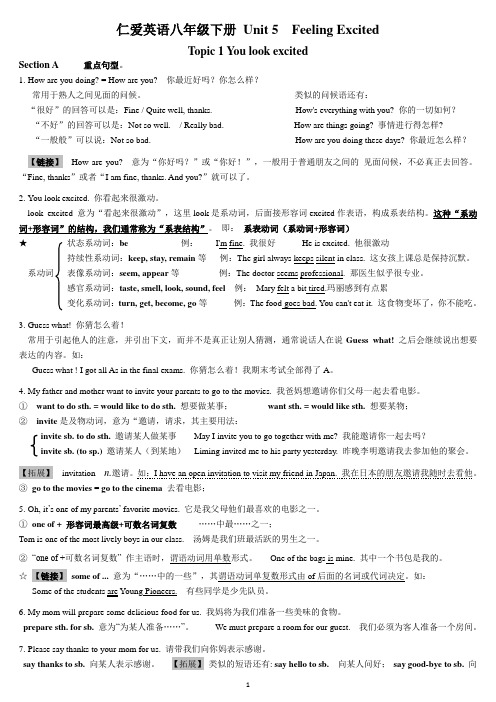
仁爱英语八年级下册Unit 5 Feeling ExcitedTopic 1 You look excitedSection A 重点句型。
1.How are you doing? = How are you? 你最近好吗?你怎么样?常用于熟人之间见面的问候。
类似的问候语还有:“很好”的回答可以是:Fine / Quite well, thanks. How's everything with you? 你的一切如何?“不好”的回答可以是:Not so well. / Really bad. How are things going? 事情进行得怎样?“一般般”可以说:Not so bad. How are you doing these days? 你最近怎么样?【链接】How are you? 意为“你好吗?”或“你好!”,一般用于普通朋友之间的见面问候,不必真正去回答。
“Fine, thanks”或者“I am fine, thanks. And you?”就可以了。
2.You look excited. 你看起来很激动。
look excited 意为“看起来很激动”,这里look是系动词,后面接形容词excited作表语,构成系表结构。
这种“系动词+形容词”的结构,我们通常称为“系表结构”。
即:系表动词(系动词+形容词)★状态系动词:be 例:I'm fine. 我很好He is excited. 他很激动持续性系动词:keep, stay, remain等例:The girl always keeps silent in class. 这女孩上课总是保持沉默。
系动词表像系动词:seem, appear等例:The doctor seems professional. 那医生似乎很专业。
感官系动词:taste, smell, look, sound, feel 例:Mary felt a bit tired.玛丽感到有点累变化系动词:turn, get, become, go等例:The food goes bad. You can't eat it. 这食物变坏了,你不能吃。
(完整)仁爱英语七年级下Unit_5_Topic1_练习题(2)
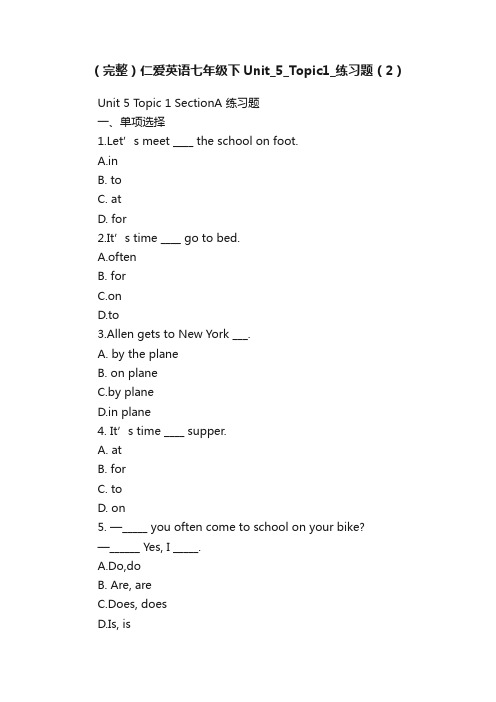
(完整)仁爱英语七年级下Unit_5_Topic1_练习题(2)Unit 5 Topic 1 SectionA 练习题一、单项选择1.Let’s meet ____ the school on foot.A.inB. toC. atD. for2.It’s time ____ go to bed.A.oftenB. forC.onD.to3.Allen gets to New York ___.A. by the planeB. on planeC.by planeD.in plane4. It’s time ____ supper.A. atB. forC. toD. on5. —_____ you often come to school on your bike?—______ Yes, I _____.A.Do,doB. Are, areC.Does, doesD.Is, is6.—How do you usually come to school? —I usually come to school ____ foot.A.InB. byC. withD.on7. She looks_____. Ask her to help you.A. oldB. sorryC.wellD. kind8.—____ do you usually go to school? —By bike.A.WhatB.WhenC.HowD.Which9.—Happy New Year!—________ !A.Thank youB. Not at allC. The same to youD.You are welcome10. My bool is interesting._____ yours?A.What isB.Whose isC.How aboutD.What is like二、句型转换1. Tom usually drives to work. (变同义句)Tom usually _____ _____ ______ ______ ______.2. 我们中有五人骑自行车上学。
七年级英语(仁爱版)下册 Unit-5-Topic-1 知识点总结语言点归纳

知识点七年级英语(仁爱版)下册Unit-5-Topic-1语言点归纳Unit 5 Topic 1I 重点词汇和短语gate, by, always, plane, train, ship, boat, Ms., grandmother, group, weekday, early, bird, catch, seldom, walk, never, sometimes, ride, park, watch, TV, homework, life, American, or, few, day, rest, play, basketball, swim, ball, game, read, listen, library, once, twice, week, every, must, first, music, begin, while, wall, bed.the same to, come on, on foot, by plane, know about, for a while, watch TV, do (one’s) homework, have lunch, at school, have a rest, be different from, go swimming, listen to, go to bed, go to school, have classes.II 语言点Section A1. a) ---Happy New Year! ---- The same to you! / You, too. 新年快乐!也祝你新年快乐!b) ----Happy birthday! -----Thank you! 生日快乐!谢谢!2. How about you? = What about you? 你怎么样?3. Oh, your new bike looks very nice! 哦,你的新自行车看起来很好看。
仁爱版英语八下 Unit 5 Topic 1 重点知识点总结
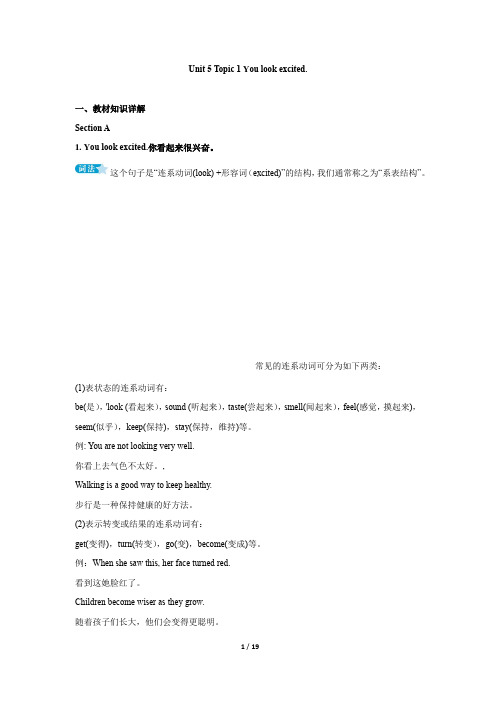
Unit 5 Topic 1 Y ou look excited.一、教材知识详解Section A1. Y ou look excited.你看起来很兴奋。
这个句子是“连系动词(look) +形容词(excited)”的结构,我们通常称之为“系表结构”。
常见的连系动词可分为如下两类:(1)表状态的连系动词有:be(是),'look (看起来),sound (听起来),taste(尝起来),smell(闻起来),feel(感觉,摸起来),seem(似乎),keep(保持),stay(保持,维持)等。
例: You are not looking very well.你看上去气色不太好。
,Walking is a good way to keep healthy.步行是一种保持健康的好方法。
(2)表示转变或结果的连系动词有:get(变得),turn(转变),go(变),become(变成)等。
例:When she saw this, her face turned red.看到这她脸红了。
Children become wiser as they grow.随着孩子们长大,他们会变得更聪明。
2. My father and mother want to invite your parents to go to the movies.我父母想邀请你父母一起去看电影。
invite vt.邀请。
固定短语:invite sb.to do sth/to somewhere例:He invites us to his restaurant. = He invites us to go to his restaurant.他邀请我们去他的餐馆。
go to the movies = go to the cinema 去看电影invitation n.邀请。
例:I have an open invitation to visit my friend in Japan.我在日本的朋友邀请我随时去看他。
仁爱版八年级下 Unit 5 Topic 1 课文讲解

Unit 5 Topic 1Section A1.How are you doing?你最近怎么样?如果最近感觉不错的话就回答:I'm fine/quite well,thanks. (And you?),但是如果最近比较糟糕倒霉的话可以这样说:Not so well/Rather badly.还有如果一般般的话就可以说:Just so so/Not so bad.2.You look excited.你看起来很兴奋。
这是一个系表结构,即:连系动词(look )+形容词( excited)。
常见的连系动词可以分为以下两大类:(1)表示状态的连系动词:be(是),look(看起来),sound(听起来),smell(闻起来),feel(摸起来,感觉),taste(尝起来),seem(似乎,好像),keep(保持),stay(保持)等。
如:My grandma is fine.我奶奶很好。
That cat looks very funny.那只猫看起来很滑稽。
The song sounds good.这首歌听起来不错。
The food smells nice.这食物闻起来香。
I always feel tired these days.这些天我总是感觉累。
Miss Tang seems very angry.唐老师好像非常生气。
Running is a good way to keep healthy.跑步是保持健康的一个好方法。
(2)表示动态的连系动词:get(变得),turn(转变),go(变),become(变成) 等。
如:Spring is here; the weather is getting warmer andwarmer.春天来了,天气越来越暖和了。
When she saw the teacher coming into theclassroom,her face turned red at once.当她看见老师正走进教室的时候,她的脸立刻就变红了。
仁爱英语七年级下五单元topic1 知识点
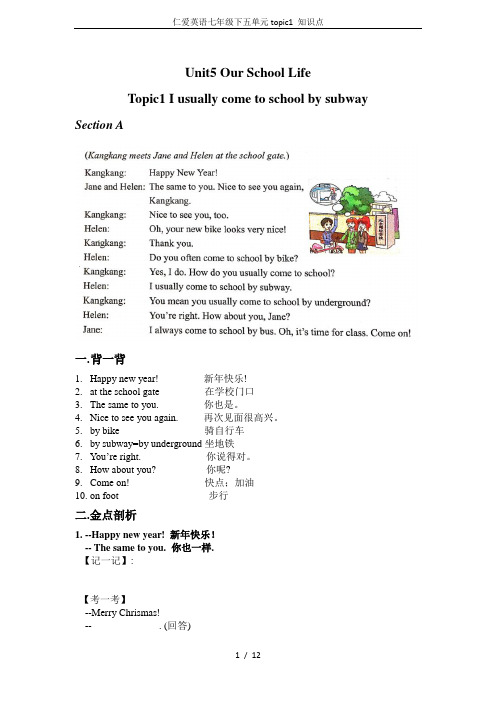
Unit5 Our School LifeTopic1 I usually come to school by subway Section A一.背一背1.Happy new year! 新年快乐!2.at the school gate 在学校门口3.The same to you. 你也是。
4.Nice to see you again. 再次见面很高兴。
5.by bike 骑自行车6.by subway=by underground坐地铁7.You’re right. 你说得对。
8.How about you? 你呢?e on! 快点;加油10.on foot 步行二.金点剖析1. --Happy new year! 新年快乐!-- The same to you. 你也一样.【记一记】:【考一考】--Merry Chrismas!-- _____________. (回答)2. Oh, your new bike looks very nice! 你的新车看起来很漂亮!【记一记】:拓展:look ____ 看look ____ 看上去像look ____ 照看【考一考】1. Ann’s mother is not at home. So Ann has to _________ her sister.2.Jim _______ his father. They both(都) have small eyes.3. Please _______ the photo! It’s wonderful.4. Your dress _____ very nice. May I have a look?A. watchB.seesC. looksD. shows3.--How do you usually come to school? 你平时怎么去上学?-- I usually come to school by subway.【记一记】:注意:① by,on, in 引导的短语在句中只能作状语,与go,come,get等连用。
Unit 5 Topic 1 Section B-八年级英语下册(仁爱版)

While-listening
4a Read the following words, paying attention to the sounds of the underlined letters. Try to find the rules and add more words.
asked stopped washed
While-liste4nbingRead the sentences in the box and pay attention to the stress, liaison and
intonation. Choose the correct ones to complete the conversation. Then practice it with your partner.
a. ˈHow are you ˈdoing?
b. ˈWhat a ˈpity!
c. I don’t like it at all.
d. ˈGuess ˈwhat!
e. We ˈfelt exˈcited to ˈhear it.
f. ˈHow did the ˈmusic ˈsound?
A: Hi, Kangkang. _____a______
loved
learned called
excited interested disappointed
While-listeRneinagd aloud the words and group them according to the pronunciation of the underlined letters of the words.
英
语
Warming up—Pre-listening—While-listening—Post-listening—Exercises —Summary
英语八年级下导学练 unit5 topic1

八年级英语Unit5 Topic 1 Why all the smiling faces?Section A 导学练课型:新授编写审核:初二备课组姓名_____________★学习目标:1.表达情感的形容词2.系动词的用法一.课前背诵准备重点词汇invite sb. to do sth . 邀请某人做某事be worried about担心=worry aboutsay thanks/sorry/goodbye to 向……道谢/道歉/道别be unpopular with 没人缘的;不受欢迎的;不得人心的表示情感的形容词excited感到兴奋的surprised 吃惊的 happy 快乐的unhappy/ sad 伤心的angry / mad 生气的worried 焦急的afraid/ frightened 害怕的disappointed 失望的proud 自豪的lonely 孤单的nervous 紧张不安的interested 感到有趣的重点句型1. How are you doing? 你们/你好吗?2. You look excited. 你看起来很兴奋.3. Please say thanks to your mom.请向你们的妈妈道谢.4. Guess what!你猜看看怎么着?5. Why all the smiling faces? 为什么大家都笑容满面?一.翻译下列词组1. 邀请某人去做某事_______________2. 为某人准备某物________________3. 看电影____________________4.想做某事_______________________5. 向某人道谢/道歉/道别______________________________________________课堂同步一写出先列表情的英文单词_________ _________ _________ _________ 二.翻译下列词组1.看起来很激动____________ 2…之一_______________________3. 看起来很疲劳___________4.听起来很棒__________________5.对…感到担心____________6.感到很失望_________________ 三.快乐译吧:根据汉语意思完成句子。
七年级英语下册Unit5OurschoollifeTopic1IusuallycometoschoolbysubwaySectionB教案(新版)仁爱版
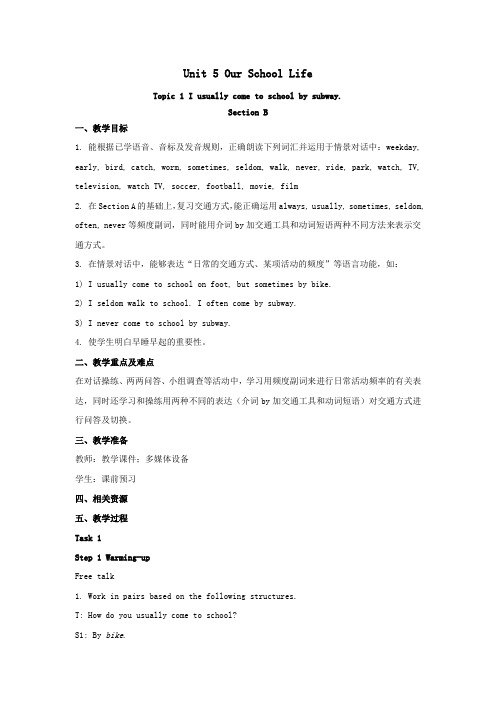
Unit 5 Our School LifeTopic 1 I usually come to school by subway.Section B一、教学目标1. 能根据已学语音、音标及发音规则,正确朗读下列词汇并运用于情景对话中:weekday, early, bird, catch, worm, sometimes, seldom, walk, never, ride, park, watch, TV, television, watch TV, soccer, football, movie, film2. 在Section A的基础上,复习交通方式,能正确运用always, usually, sometimes, seldom, often, never等频度副词,同时能用介词by加交通工具和动词短语两种不同方法来表示交通方式。
3. 在情景对话中,能够表达“日常的交通方式、某项活动的频度”等语言功能,如:1) I usually come to school on foot, but sometimes by bike.2) I seldom walk to school. I often come by subway.3) I never come to school by subway.4. 使学生明白早睡早起的重要性。
二、教学重点及难点在对话操练、两两问答、小组调查等活动中,学习用频度副词来进行日常活动频率的有关表达,同时还学习和操练用两种不同的表达(介词by加交通工具和动词短语)对交通方式进行问答及切换。
三、教学准备教师:教学课件;多媒体设备学生:课前预习四、相关资源五、教学过程Task 1Step 1 Warming-upFree talk1. Work in pairs based on the following structures.T: How do you usually come to school?S1: By bike.T: How do you usually go to the zoo?S2: By bus.2. Choose a few pairs to act them out.【设计意图】复习上节课所学知识点,培养学生口语表达能力。
2021年仁爱版七年级下Unit5 topic1 section B课后练习
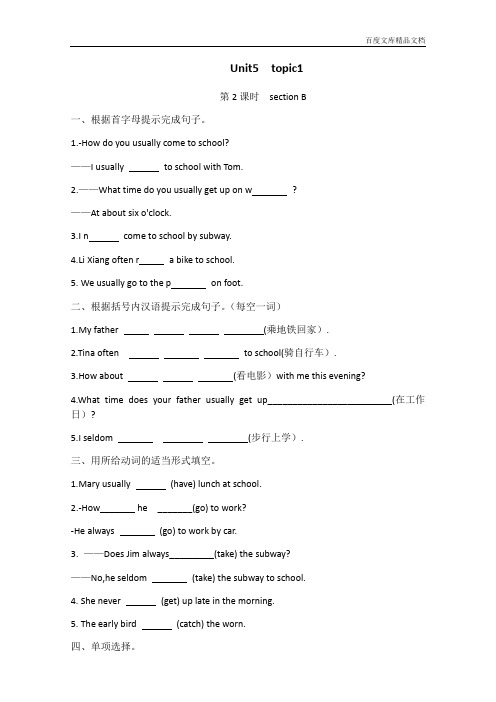
Unit5 topic1第2课时section B一、根据首字母提示完成句子。
1.-How do you usually come to school?——I usually to school with Tom.2.——What time do you usually get up on w ?——At about six o'clock.3.I n come to school by subway.4.Li Xiang often r a bike to school.5. We usually go to the p on foot.二、根据括号内汉语提示完成句子。
(每空一词)1.My father (乘地铁回家).2.Tina often to school(骑自行车).3.How about (看电影)with me this evening?4.What time does your father usually get up_________________________(在工作日)?5.I seldom (步行上学).三、用所给动词的适当形式填空。
1.Mary usually (have) lunch at school.2.-How_______ he _______(go) to work?-He always (go) to work by car.3.——Does Jim always_________(take) the subway?——No,he seldom (take) the subway to school.4. She never (get) up late in the morning.5. The early bird (catch) the worn.四、单项选择。
( )1. Xiao Ming never home on foot.She often takes the subway .A.go toB.goes toC.walksD.goes( )2. Jenny likes movies. She usually on Sunday.A.plays soccerB. does her homeworkC.sees a movieD.takes the subway ( )3.-How do you usually go to work?-I usually go to work car.A.byB.inC.onD.for( )4.—do you get up on weekends?-At about 6:10.A.HowB.WhatC.What timeD.How long( )5.-Are you often late for school?-No,_____.I always get to school early.A.alwaysB. usuallyC.neverD.very often五、根据要求变换句型,每空填一词。
仁爱版2020年春七年级英语下学期 Unit5 Topic1 随堂练习
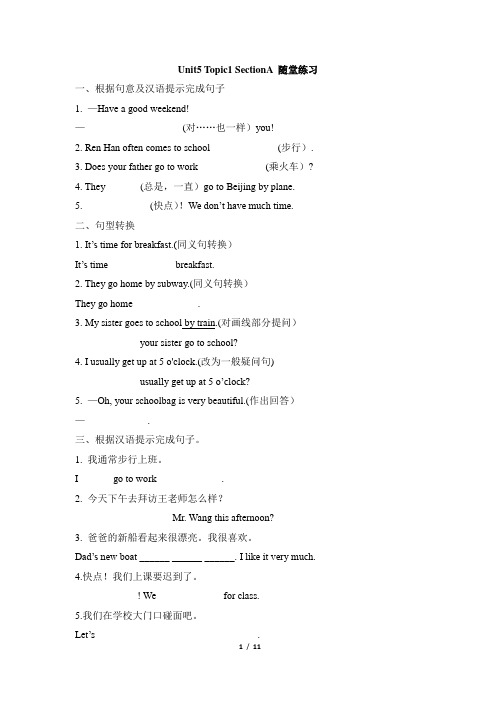
Unit5 Topic1 SectionA 随堂练习一、根据句意及汉语提示完成句子1. —Have a good weekend!—______ ______ ______ (对……也一样)you!2. Ren Han often comes to school ______ ______ (步行).3. Does your father go to work ______ ______ (乘火车)?4. They ______ (总是,一直)go to Beijing by plane.5. ______ ______ (快点)!We don’t have much time.二、句型转换1. It’s time for breakfast.(同义句转换)It’s time ______ ______ breakfast.2. They go home by subway.(同义句转换)They go home ______ ______.3. My sister goes to school by train.(对画线部分提问)______ ______ your sister go to school?4. I usually get up at 5 o'clock.(改为一般疑问句)______ ______ usually get up at 5 o’clock?5. —Oh, your schoolbag is very beautiful.(作出回答)—______ ______.三、根据汉语提示完成句子。
1. 我通常步行上班。
I ______ go to work ______ ______.2. 今天下午去拜访王老师怎么样?______ ______ ______ Mr. Wang this afternoon?3. 爸爸的新船看起来很漂亮。
我很喜欢。
Dad’s new boat ______ ______ ______. I like it very much.4.快点!我们上课要迟到了。
仁爱版八年级英语下册Unit 5 Topic 1课堂检测题
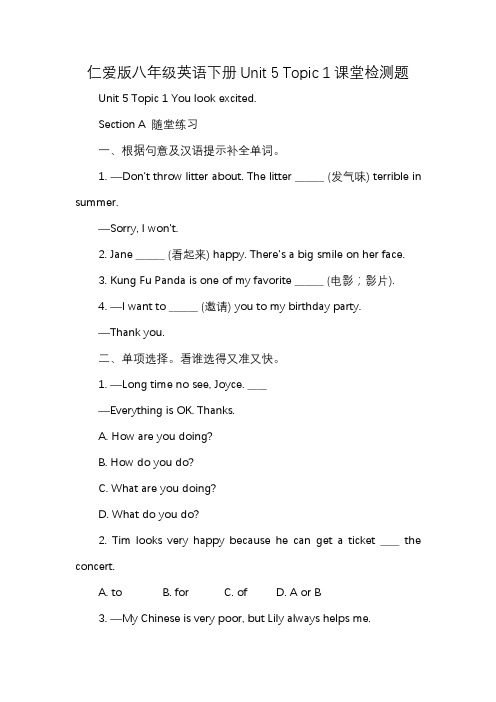
仁爱版八年级英语下册Unit 5 Topic 1课堂检测题Unit 5 Topic 1 You look excited.Section A 随堂练习一、根据句意及汉语提示补全单词。
1. —Don’t throw litter about. The litter ______ (发气味) terrible in summer.—Sorry, I won’t.2. Jane ______ (看起来) happy. There’s a big smile on her face.3. Kung Fu Panda is one of my favorite ______ (电影;影片).4. —I want to ______ (邀请) you to my birthday party.—Thank you.二、单项选择。
看谁选得又准又快。
1. —Long time no see, Joyce. ____—Everything is OK. Thanks.A. How are you doing?B. How do you do?C. What are you doing?D. What do you do?2. Tim looks very happy because he can get a ticket ____ the concert.A. toB. forC. ofD. A or B3. —My Chinese is very poor, but Lily always helps me.—You should ____ her.A. be popular withB. say thanks toC. be angry withD. listen to4. The news ____ interesting. Please tell me more.A. feelsB. listensC. hearsD. sounds5. —Would you like to invite Mr. Wang ____ sports with you? —Yes, I’d love to.A. to playB. to lookC. playingD. looking三、根据汉语意思完成下列句子。
仁爱英语九年级下册unit5topic1语言词汇知识点解析,知识点讲解

仁爱九年级Unit 5 China and the WorldTopic 1 China attracts millions of tourists from all over the world一.重要词汇1.重点词汇和短语:attract吸引,引起birthplace发源地,出生地fetch去取来,去带来introduce介绍detail详细strange奇怪有,陌生的pine松树length长,长度waterfall瀑布height高度,身高introduce 介绍,把...介绍给strange(adj)奇怪的height(n)高度,身高stone 石头,石料guard(V)保卫、守护、看守, treasure 宝藏、珍宝state 国家、洲remain 遗留、剩余, separate 分开,隔开, enemy 敌军, expect 期望,预料suppose 假定,猜想,认为, a great number of大量,许多in detail 相信地lie in 位于play an important part in 发挥重要作用扮演重要角色wear away磨损,消逝, separate...from使...和...分离, regard as 当作be famous for 因为...而出名along with...和..一起二.语法that/which 引导的定语从句。
三.重点句型及交际用语:1. China is a great country that has about 5000 years of history.2. There are many places of interest which attract millions of tourists from all over the world every year.3. There are a great number of rivers in China.4. I can fetch you Guide to China.5. It’s a book which introduces China in detail.6. It lies in Anhui Province.7. It’s a place w hich /that is worth visiting.8. It also plays an important part in Chinese festivals.9. The Great Wall is a treasure of Chinese civilization and it is regarded as a symbol of the Chinese nation.10. What is it famous for?任务型学习目标1.掌握that/which 引导的定语从句;2.会正确描述名山大川等名胜,并会表达赞同;3.了解我国的名山大川,风景名胜,雄伟建筑和悠久文化,增强学生的爱国之情;4.学会把含有定语从句的复合句变成两个简单句,以便于更容易地理解那些较长复合句的意思。
仁爱版七年英语下册Unit 5 Our School Life Topic 1 .Section B 教学设计

新仁爱版七年英语下册Unit 5 Our School Life Topic 1I usually come to school by subway.Section B 教学设计一、整体设计思路,指导依据说明《中小学英语课程标准》指出:英语教学中应体现交际性,要结合学生的年龄特点、生理、心理特点和生活实际,创设交际情景,通过大量的语言实践,使学生获得综合运用英语和语言技能进行交际的能力,要为学生提供自主学习和相互交流的机会以及充分表现和自我表现的空间。
鼓励学生通过体验、讨论、合作、探究等方式,发展听说读写的综合语言技能。
针对初中英语新教材容量大的特点,依据仁爱英语教材的在做中学即learning by/in doing的教学思想, 课堂采用小组合作学习模式,过程评价模式。
本单元的中心话题是Our School Life,这话题与学生的日常生活息息相关,所以,在教学设计中,可以根据学生的真实生活创设情景,进行语言的操练,以调动学生的创造性与积极性,激发学生学习英语的兴趣,使学生的自主学习能力真正得以提高。
二、教学背景分析1. 教材分析。
本单元的主题是Our School Life,共包括三个话题 I usually come to school by subway.A few students are running aroun d the playground.和My school life is very interesting.话题一主要围绕交通方式、日常活动的频度等展开。
本课通过Helen, Michael和Sally三个人物的对话,复习交通方式的同时学习用频度副词来进行日常活动频率等的有关表达,如“How do you usually come to school?”, “I usually come to school on foot,but sometimes by bike.”,此外还将学习和操练用两种不同的方式(介词by+交通工具和动词短语)对交通方式进行问答及切换。
七年级英语仁爱版下册Unit 5 topic 1---3 同步测试题附答案不全
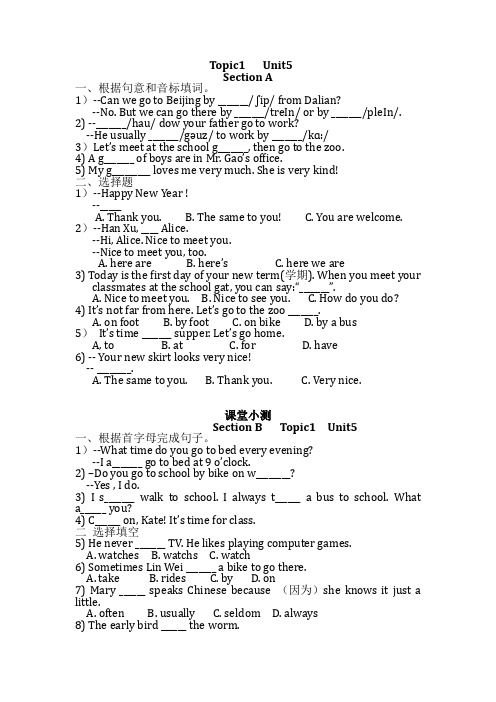
Topic1 Unit5Section A一、根据句意和音标填词。
1)--Can we go to Beijing by _______/ ʃip/ from Dalian?--No. But we can go there by _______/treIn/ or by _______/pleIn/. 2) --_______/hau/ dow your father go to work?--He usually _______/gәuz/ to work by _______/kɑ:/3)Let’s meet at the school g_______, then go to the zoo.4) A g_______ of boys are in Mr. Gao’s office.5) My g_________ loves me very much. She is very kind!二、选择题1)--Happy New Year !--_____A. Thank you.B. The same to you!C. You are welcome. 2)--Han Xu, ____ Alice.--Hi, Alice. Nice to meet you.--Nice to meet you, too.A. here areB. here’sC. here we are3) Today is the first day of your new term(学期). When you meet yourclassmates at the school gat, you can say:“_______”.A. Nice to meet you.B. Nice to see you.C. How do you do?4) It’s not far from here. Let’s go to the zoo _______.A. on footB. by footC. on bikeD. by a bus5)It’s time _______ supper. Let’s go home.A, to B. at C. for D. have6) -- Your new skirt looks very nice!-- ________.A. The same to you.B. Thank you.C. Very nice.课堂小测Section B Topic1 Unit5一、根据首字母完成句子。
仁爱英语八下Unit5教案
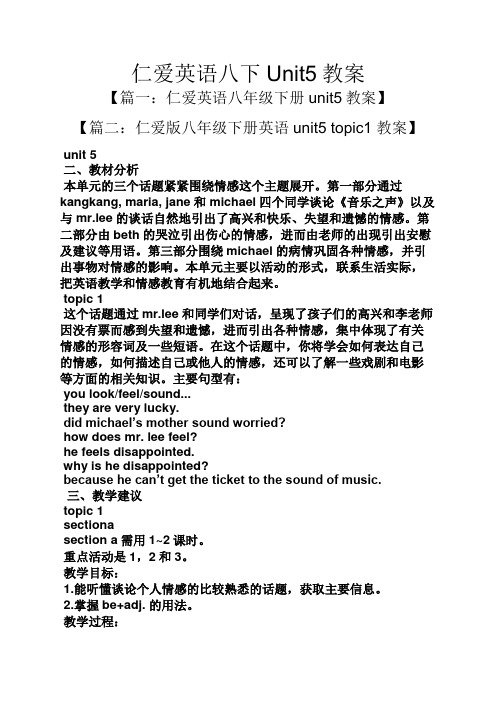
仁爱英语八下Unit5教案【篇一:仁爱英语八年级下册unit5教案】【篇二:仁爱版八年级下册英语unit5 topic1 教案】 unit 5二、教材分析本单元的三个话题紧紧围绕情感这个主题展开。
第一部分通过kangkang, maria, jane和 michael四个同学谈论《音乐之声》以及与 mr.lee的谈话自然地引出了高兴和快乐、失望和遗憾的情感。
第二部分由beth的哭泣引出伤心的情感,进而由老师的出现引出安慰及建议等用语。
第三部分围绕michael的病情巩固各种情感,并引出事物对情感的影响。
本单元主要以活动的形式,联系生活实际,把英语教学和情感教育有机地结合起来。
topic 1这个话题通过mr.lee和同学们对话,呈现了孩子们的高兴和李老师因没有票而感到失望和遗憾,进而引出各种情感,集中体现了有关情感的形容词及一些短语。
在这个话题中,你将学会如何表达自己的情感,如何描述自己或他人的情感,还可以了解一些戏剧和电影等方面的相关知识。
主要句型有:you look/feel/sound...they are very lucky.did michael’s mother sound worried?how does mr. lee feel?he feels disappointed.why is he disappointed?because he can’t get the ticket to the sound of music.三、教学建议topic 1sectionasection a需用1~2课时。
重点活动是1,2和3。
教学目标:1.能听懂谈论个人情感的比较熟悉的话题,获取主要信息。
2.掌握be+adj. 的用法。
教学过程:第一步:复习师生问候。
谈谈寒假生活及过春节的感受。
如:teacher: how are you? / how are you doing?student1: fine,thanks!teacher: you look so happy, why?student1: i come back to school again, so i’m glad to see my classmates.teacher: did you have a good winter holiday?student2:yes,i did.teacher: how about your spring festival?student2:i had a wonderful spring festival. i got...teacher: why all the smiling faces?students: because today is the first day of this term...第二步:呈现1.在师生对话之后,老师板书呈现课题。
Unit5SectionB知识点讲解例题鲁教版(五四学制)八年级英语下册(1)

Unit 5 I think that mooncakes are delicious!Section B一、短语默写1.打扮成...2.点蜡烛3.卡通人物4.捉弄某人5.招待某人6.与人为善;善待某人7.圣诞节的真正意义8.某人写的一部著名小说9.过去常常/一直做某事10.受到惩罚11.警告某人做某事12.最终成为;最后处于13.期盼某人做某事14.使某人想起...15.允诺做某事16.传播爱和欢乐17.下蛋18.不但...而且...19.分发;发放20.分散;扩散二、知识点讲解1.What does Wu Yu think of this festival? 吴宇认为这个节日怎么样?(1)What do/does sb. think of…?某人认为…怎么样?相当于“How do/does sb. like…?”用来询问某人对…的看法(2)think of想起;认为;考虑。
其中of为介词,其后可接名词、代词或动词-ing形式作宾语。
2. A Christmas Carol is a famous short novel written by Charles Dickens.<<圣诞欢歌>>是查尔斯·狄更斯写的一部著名短篇小说。
written by Charles Dickens是过去分词作后置定语修饰名词novel, written与novel之间为被动关系。
分词作定语的区别:现在分词作定语:所修饰的词和分词之间是主动关系;现在分词表示动作正在进行正在扫地的那个学生是我们的班长。
The student sweeping the floor is our monitor.过去分词作定语:所修饰的词和分词之间是被动关系;过去分词表示完成的事。
被校长表扬的那个学生是我们的班长。
The student praised by headmaster is our monitor.练习:I don't know the people______________(lie) on the grass(草).My parents haven’t read the novels_____________(write) by Han Han.The nurse called Carolyn is patient with her patients.(英译汉)____________________________________________________________________________3.Kids will ____________________on you if you don’t _______________________.如果你不招待他们,孩子们就会对你搞恶作剧我们的班主任总是把我们当作她的孩子_____________________________________________________谢谢你热情地款待了我们_________________________________________________________________她请我们吃了些美味的鸡肉。
Unit 5 Topic 1 教学内容整合仁爱七年级英语下册
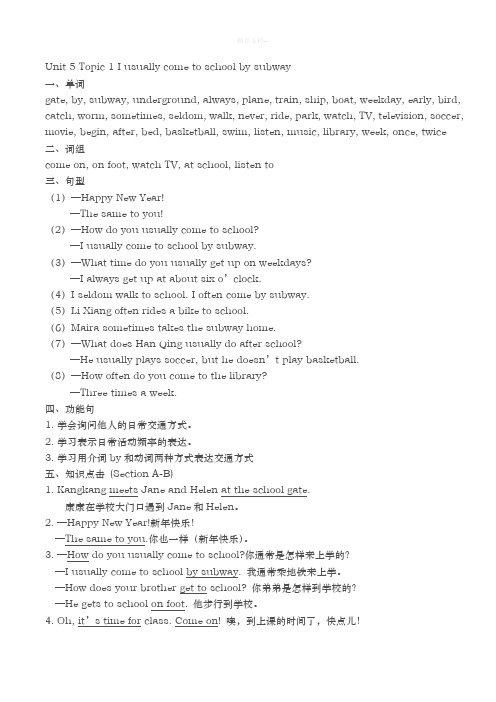
Unit 5 Topic 1 I usually come to school by subway一、单词gate, by, subway, underground, always, plane, train, ship, boat, weekday, early, bird, catch, worm, sometimes, seldom, walk, never, ride, park, watch, TV, television, soccer, movie, begin, after, bed, basketball, swim, listen, music, library, week, once, twice 二、词组come on, on foot, watch TV, at school, listen to三、句型(1)—Happy New Year!—The same to you!(2)—How do you usually come to school?—I usually come to school by subway.(3)—What time do you usually get up on weekdays?—I always get up at about six o’clock.(4)I seldom walk to school. I often come by subway.(5)Li Xiang often rides a bike to school.(6)Maira sometimes takes the subway home.(7)—What does Han Qing usually do after school?—He usually plays soccer, but he doesn’t play basketball.(8)—How often do you come to the library?—Three times a week.四、功能句1.学会询问他人的日常交通方式。
- 1、下载文档前请自行甄别文档内容的完整性,平台不提供额外的编辑、内容补充、找答案等附加服务。
- 2、"仅部分预览"的文档,不可在线预览部分如存在完整性等问题,可反馈申请退款(可完整预览的文档不适用该条件!)。
- 3、如文档侵犯您的权益,请联系客服反馈,我们会尽快为您处理(人工客服工作时间:9:00-18:30)。
snowed treated
knocked looked
crowded stayed
1. : When the pronunciation of the word ends with a voiceless consonant (清辅音).
2. : When the pronunciation of the word ends with a voiced consonant (浊辅音) or vowels(元音).
Kangkang’s house. But they felt _s_o_r_ry__ for Michael. • 5. The food smelled _n_ic_e__ and tasted d_e_l_ic_i_o_u_s_.
Listen and find out the key structure: linking verbs + adjectives.
B: Very well._______d____ Maria and I went to see the
opera, Cats, last night.
A: Really? You look very happy, so how did you like it?
B: We loved it very much because it was so funny.The content words such as
a. ˈHow are you ˈdoing?
b. ˈWhat a ˈpity!
c. I don’t like it at all.
d. ˈGuess ˈwhat!
e. We ˈfelt exˈcited to ˈhear it.
f. ˈHow did the ˈmusic ˈsound?
A: Hi, Kangkang. ___a________
The children were glad to have supper at Kangkang’s house. The food smelt nice and tasted delicious. They had a good time together. But they missed Michael and felt sorry for him.
1c Work in groups of five and retell 1a according to the following key points. Then link them together to form a passage.
• Mr. Brown unhappy and disappointed
(use as many words about feelings as you can)
Answer the questions
• How does Kangkang feel? Why? • What are the parents going to do? • When are they going? • What do the children plan to do then? • What will Kangkang’s mother do for the children? • Who did Kangkang see on the way? What
Opera is boring.
( F)
Listen and match the pictures of their favorite things with the names.
Maria
Jane Kangkang
Kangkang’s parents
1a Look, listen and say.
happened? • What’s Mr. Brown’s favorite movie?
1b Listen to 1a and mark T (True) or F (False).
• 1. Mr. Brown couldn’t get a ticket to Avatar,
so he was unhappy.
清清浊浊元也浊 3. : When the pronunciation of the word ends with /t/ or /d/.
4b Read the sentences in the box and pay attention to the stress, liaison and intonation. Choose the correct ones to complete the conversation. Then practice it with your partner.
• 2. The music in the movie sounded _b_e_a_u_t_if_u_l __. • 3. The parents felt _h_a_p_p_y___ to see the movie
together. • 4. The children were _g_l_a_d__ to have supper at
( F)
• 2. Jane likes the film, The Sound of Music,
because it is very interesting.
( T)
• 3. The opera, Cats, is Maria’s favorite. (T )
• 4. Kangkang’s parents think that Beijing
2a Read the following words, paying attention to the stress and the underlined parts. Then listen and check.
ˈinterest disapˈpoint ˈinteresting disapˈpointing ˈinterested disapˈpointed
ˈworry ˈworrying ˈworried
bore ˈboring ˈbored
exˈcite exˈciting exˈcited
Remembering words in groups can help you learn them better.
Will Mr. Brown be able to see the movie? Listen and find the answer.
he feels a little unhappy. Make
similar conversations to 1a.
Find out and learn the key points.
• 你知道布朗先生怎么了吗?
Do you know what’s the matter with Mr. Brown?
Read aloud the words and group them according to the pronunciation of the underlined letters of the words.
decided watched planned
hoped
shouted prepared
2b FilБайду номын сангаас in the blanks with the correct forms of the given words.
Michael: Hi, Steve! This is Michael. I’ve got a bad cold. My mother will stay at home with me. Are you _in_t_e_r_e_s_t_e_d ( interest )in her ticket to The Sound of Music ?
She is feeling _s_u_rp_r_is_e_d_.
He is feeling __h_a_pp_y__/ _e_x_c_it_e_d__.
He is _u_p_s_e_t /_u_n_h_a_p_p_y_ _d_is_a_p_p_o_i_n_te_d.
She is very __sa_d__.
• 他似乎有点不高兴。 He seems to be unhappy. • 我希望他下次能看这部电影。 I hope he can see the movie next time. • 他们也为Michael 感到遗憾。 They also felt sorry for Michael.
She looks very f_ri_g_h_te_n_e_d_. She seems very frightened.
seem 似乎,好像
He looks very _a_n_g_ry__. He seems to be angry.
A: How are you feeling today? B: I’m feeling….
• Jane also The Sound of Music • Maria Cats funny and interesting
• Kangkang’s parents Beijing Opera • Kangkang Beijing Opera boring
The Sound of Music Avatar exciting
Steve: OK, you can tell him the __e_x_c_i_ti_n_g__ (excite) news right now!
3 Listen to the passage and complete the sentences.
• 1. Mr. Brown was _e_x_c_it_e_d__ to have a ticket and he also felt sorry for Michael.
